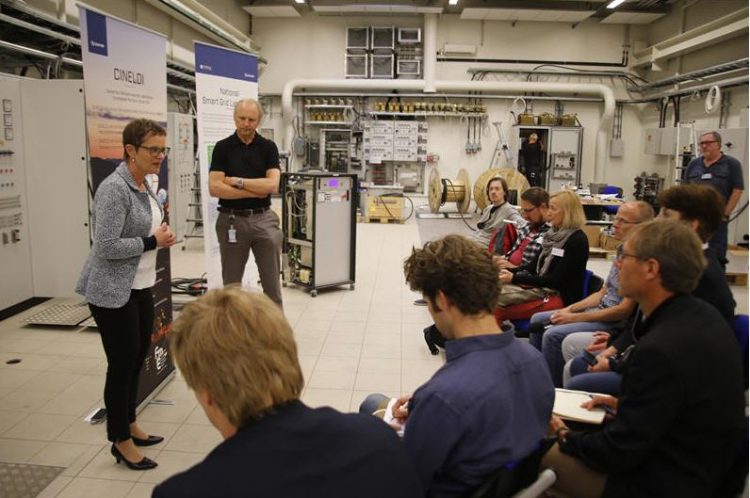A major research effort into tomorrow's digital power grids

Gerd Kjølle and Kjell Sand giving a presentation to visiting European journalists in the Smart Grid laboratory in June 2016. Photo: Gry Karin Stimo/SINTEF
The aim of a new research centre called CINELDI (Centre for INtelligent ELectricity DIistribution – to empower the future Smart Grid) is to develop systems as part of tomorrow's adaptable, robust and intelligent energy system.
The centre is headed by SINTEF Energy Research and will operate for between five and eight years with a budget of about NOK 360 million. The centre will be opened on Wednesday 21 September together with the new NTNU/SINTEF SmartGrid Lab.
Saving money and protecting the environment
“Smart Grids provide output and energy efficiency, and make it easier to exploit renewable energy sources. They can also help towards removing the need to expand existing grid capacity – something which would be unavoidable if Smart Grids hadn't entered the stage”, says SINTEF's Gerd Kjølle, who will be heading the CINELDI centre.
Major demands are placed on the electricity grid when we cook our meals on induction hobs and charge up our electric cars at the same time. But Smart Grids enable us, for example, to give the grid operator permission to disconnect consumption linked to water heating, thus avoiding the need to expand grid capacity.
No organisation can introduce Smart Grids alone
The CINELDI research centre is headed by SINTEF Energy Research in close collaboration with NTNU. It also has many research partners in Europe, Japan and the USA.
“No organisation can introduce Smart Grids alone”, says Kjølle. “This is why we're involving partners from among the grid companies, system operators, technology manufacturers, member organisations and the pubic authorities”, she says.
The new Smart Grid laboratory will enable researchers to simulate real situations arising in power systems of all sizes in a way that has not been possible before.
“We can test new systems developed by technology manufacturers, research projects or students by subjecting them to all magnitudes of interruptions, noise, communication delays and so on”, says Kjell Sand, who is Project Manager for the Norwegian Smart Grid laboratory from Norwegian University of Science and Technology, and a member of the CINELDI management team. “Testing will provide us with assurances that the systems can handle situations that they will be exposed to as part of a future smart power system”, he says.
Facts: The Centres for Environmentally-Friendly Energy Research (FMEs) represent a focused and long-term research effort in the fields of renewable energy, energy efficiency, CO2 management and the social sciences. SINTEF is heading three of the new FMEs: CINELDI, HighEFF and NCCS. SINTEF is also a participant in five other new FMEs.
Media Contact
All latest news from the category: Power and Electrical Engineering
This topic covers issues related to energy generation, conversion, transportation and consumption and how the industry is addressing the challenge of energy efficiency in general.
innovations-report provides in-depth and informative reports and articles on subjects ranging from wind energy, fuel cell technology, solar energy, geothermal energy, petroleum, gas, nuclear engineering, alternative energy and energy efficiency to fusion, hydrogen and superconductor technologies.
Newest articles

Sea slugs inspire highly stretchable biomedical sensor
USC Viterbi School of Engineering researcher Hangbo Zhao presents findings on highly stretchable and customizable microneedles for application in fields including neuroscience, tissue engineering, and wearable bioelectronics. The revolution in…

Twisting and binding matter waves with photons in a cavity
Precisely measuring the energy states of individual atoms has been a historical challenge for physicists due to atomic recoil. When an atom interacts with a photon, the atom “recoils” in…

Nanotubes, nanoparticles, and antibodies detect tiny amounts of fentanyl
New sensor is six orders of magnitude more sensitive than the next best thing. A research team at Pitt led by Alexander Star, a chemistry professor in the Kenneth P. Dietrich…





















